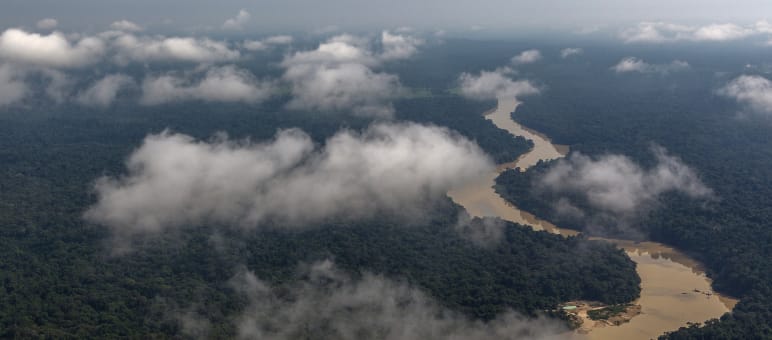
Brazil’s president vetoes parts of the “devastation bill”
Brazil: On August 8, Brazilian President Lula da Silva vetoed sections of Bill (PL) 2.159/2021. By doing so, the government partially responded to our demands. The worst has, for now, been prevented. Yet the law has entered into force and remains highly problematic despite the revisions. Moreover, Congress can still override the president’s vetoes.
Out of nearly 400 provisions, the government rejected 63 in whole or in part. A total of 26 were struck down entirely, Environment Minister Marina Silva announced at a press conference in the presidential palace in Brasília.
For projects with potentially moderate to severe environmental impacts, environmental licenses and formal approval procedures will still be required. Indigenous and Afro-Brazilian Quilombola communities will continue to be involved in these processes. The threatened Atlantic Forest (Mata Atlântica) was also protected through targeted vetoes. According to the government, these steps guarantee both environmental protection and legal certainty.
In this way, the administration has partly addressed the demands of the federal prosecutor’s office, Indigenous organizations, and human rights and environmental groups in Brazil. These groups have rejected the bill in its entirety. Passed in a late-night session of parliament on July 17, 2025, the legislation – widely described as the “devastation bill” – was called the greatest setback for environmental protection in Brazil since the country’s transition back to democracy more than 40 years ago.
Rainforest Rescue also called on President Lula da Silva to veto the bill in our petition “Brazil: President Lula, use your veto – stop the ‘devastation bill’”. A week before the decision, we had already delivered the appeal – signed by 67,000 people – to the president and his adviser Celso Amorim.
Special permits for oil drilling and road building in the Amazon
However, the president allowed many of the most damaging provisions of the law to remain. These include special permits for projects such as oil drilling at the mouth of the Amazon and new roads across the rainforest. Much of agribusiness will now also be largely exempt from licensing requirements.
Even the previous licensing rules did little to protect nature or the people living there from deforestation, destruction, and pollution. With the new law now in place, defending them will be even harder.
The government has sent Congress the revised draft and interim measures with alternative wording. Congress may still overturn the president’s vetoes at any time.
Further information on Brazil’s “devastation bill” 2.159/2021:
Detailed analysis by the Brazilian Climate Observatory (in Portuguese)
The EU also rolls back environmental legislation
The pressures are not confined to Brazil. In Germany and across the EU, lobbying against laws protecting the environment and human rights is intense. The propaganda is familiar: excessive bureaucracy is said to be strangling economic growth.
One of the measures under attack is the EU’s Regulation on deforestation-free products (EUDR), also known as the EU Forest Protection Regulation. Please add your voice to our petition “Tell the EU to stand firm against deforestation”. More than 80,000 people have already signed.
Through what is being called an Omnibus Package, the European Commission is also seeking to roll back environmental protections wholesale: “To boost our competitiveness and unleash growth, the EU needs to foster a favorable business environment and ensure that companies are not stifled by excessive regulatory burdens,” reads one of the official statements.
The Commission has launched a public consultation on simplifying environmental regulations. Anyone may submit comments until September 10 – easily and anonymously.
You can find the Commission’s feedback page here.
Please speak out against dismantling environmental legislation. The reasons could not be more urgent: the accelerating decline of nature, ecosystems, biodiversity, and the global climate are stark evidence that regulation must be strengthened, not weakened.
Government of Brazil, August 8, 2025. MEIO AMBIENTE: PL do licenciamento: com vetos, governo garante proteção ambiental e segurança jurídica: https://www.gov.br/planalto/pt-br/acompanhe-o-planalto/noticias/2025/08/pl-do-licenciamento-com-vetos-governo-garante-protecao-ambiental-e-seguranca-juridica
Tiago Rogero, The Guardian, July 17, 2025. Brazil passes ‘devastation bill’ that drastically weakens environmental law: https://www.theguardian.com/world/2025/jul/17/brazil-passes-devastation-bill-that-drastically-weakens-environmental-law
European Commission, February 12, 2025. A bolder, simpler, faster Union: the 2025 Commission work programme: https://ec.europa.eu/commission/presscorner/detail/en/ip_25_466
European Commission, February 12, 2025. A Simpler and Faster Europe: https://ec.europa.eu/commission/presscorner/api/files/attachment/880407/Factsheet_Simplification.pdf
European Commission, February 26, 2025. Questions and answers on simplification omnibus I and II: https://ec.europa.eu/commission/presscorner/detail/en/qanda_25_615